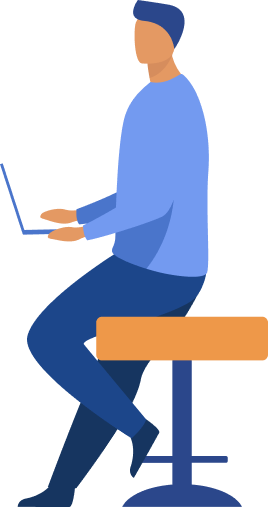Build your retail business from the ground up with financing from 1West.
Retail Business Loans
Fast, flexible working capital loans approved based on your cash flow — with no assets or collateral required.
Are you ready to put in the work and make your dream retail business a reality? Get a retail business loan from 1West!
Whether you want to run a retail store or an e-commerce business (or both), 1West can help you enjoy a steady stream of working capital to stay competitive. Call us today to get started!
What is a Retail Business Loan?
Retail business loans are loans made specifically for retailers. You can use this type of financing for anything retail-related, from jumpstarting your retail business venture to keeping it running.
In short, retail business loans are like financial booster shots for your store. With the money you’ll get from it, you’ll enable your retail business to grow and thrive.
How a Retail Loan Can Help Your Business
You can use a retail business loan for any expenses incurred while running your business. Here are some examples of how retail business loans can help your business:
Purchase Inventory
Inventory is the lifeblood of retail businesses. You’ll need to have enough to meet your customers’ demands. If you frequently run out of products, you can use inventory financing to purchase high-quality inventory.
Pay for Retail Technology
Technology can make your work easier and allow you to provide a seamless experience for your employees and customers. You can purchase retail technology solutions like mobile apps for your customers, a CRM system, or platforms to offer more payment services like Apple Pay, Amazon Pay, or Google Pay.
Keep in mind that the technology you choose should depend on your business’s goals and needs. Use your business plan or evaluate your processes and identify areas you need to improve on. For example, do you need to expand your payment options? Or do you need to upgrade your POS? Whatever you need, you can use a retail business loan to pay for new retail technology.
Renovate Your Interior
First impressions matter in the retail industry, especially if you’re running a brick-and-mortar store. Boring décor and outdated furniture can deter customers from entering your store. If you think your store’s interior could use a revamp, it’s a great idea to use a retail business loan to renovate your interior.
You can start small by painting your walls, updating your signage, and moving furniture around to give your store a new look. You can also change the layout, like positioning sale items near counters to encourage last-minute purchases or reorganizing shelves to make more room for new items. There are many different ways to style and renovate your store.
Launch a Marketing Strategy
If you want to expand your reach, get more leads, and ultimately convert them into customers, consider launching a marketing campaign. Using the funds from a loan, you can pay developers to create an e-commerce store for you, digital marketers to create social media accounts, or email your customers email newsletters.
Launching a well-researched marketing campaign will attract more customers and increase your sales.
Improve Cash Flow
Many retail businesses are subject to seasonality. If cash flow fluctuates from time to time, having quick access to financing can help bridge gaps during slower seasons. You can use the money to pay for equipment repairs and purchases, unforeseen expenses, or for day-to-day working capital needs.
Common Types of Retail Business Loans
Business Term Loans
These are straightforward loans with fixed repayment terms. You borrow a lump sum and pay it back in regular installments over a set period. Term loans are ideal for big investments like expanding your store or buying inventory.
Merchant Cash Advance
If you have consistent daily credit card sales, this option might be for you. Lenders provide you with a lump sum upfront, and you repay it through a portion of your daily credit card sales. It’s a flexible option for any small business owner, and it can help you maintain a consistent cash flow.
Business Line of Credit
Think of this like a financial safety net. You’re approved for a maximum credit limit, but you only pay interest on the amount you use. This credit line is handy for managing cash flow gaps or handling unexpected expenses.
Equipment Financing
This loan covers the cost of new registers, shelving, or other equipment. The equipment itself serves as collateral, making it easier to secure the loan.

Inventory Financing
Inventory loans are perfect for stocking up on seasonal or trendy items. They’re designed to help you purchase inventory, which often serves as collateral.
SBA Loans
The Small Business Administration (SBA) offers loans with competitive rates and favorable terms. These loans can be used for various business needs, including retail store expansion. Several SBA loan programs are available, including the SBA 7 loan and the SBA Microloan.
Business Credit Cards
While different from traditional bank loans, credit cards can provide quick access to funds for everyday business expenses. They often come with rewards and benefits tailored for big and small business owners.
Online Lenders
Many online lenders specialize in providing quick and accessible loans for retail businesses. They may have more relaxed qualification criteria and faster approval processes compared to traditional banks.
Pros and Cons of Retail Business Loans
Retail business loans come with exciting opportunities for growth and success, as well as a few financial responsibilities. Here’s a quick list of its pros and cons:
Pros
- Financial Boost – A retail business loan can provide a much-needed injection of funds for your store. It’s like a financial lifeline that can help you seize growth opportunities or navigate tough times.
- Inventory Enhancement – With the extra cash, you can stock up on the latest and most in-demand products. This means you’ll have a wider selection to offer customers, increasing sales and customer satisfaction.
- Expansion Possibilities – If you’ve been eyeing a new location or thinking about expanding your store, a retail business loan can make it happen. You can open new branches or renovate your current space to attract more customers.
- Hiring and Training – Having more funds allows you to hire additional staff or invest in employee training. This can improve customer service and overall store efficiency.
- Marketing Power – You can use the loan to invest in marketing campaigns and promotions. This can attract new customers and keep existing ones coming back for more.
Cons
- Interest Cost – Retail business loans come with interest, which means you’ll need to pay back more than you borrowed. Make sure to understand the interest rates and fees before taking out a loan.
- Debt Obligation – Taking on a loan means you’ll have to make regular payments, which can put pressure on your money flow. Ensure you can comfortably manage the repayments, including the interest rate.
- Credit Risk – If your business struggles to make loan payments, it could lead to bad credit. Having a low credit score could make it harder to secure lfuture business financing.
- Approval Challenges – Getting approved for a retail business loan can be a hurdle, especially for newer or smaller businesses. Lenders often require a solid credit history and financial documentation. Still, if your retail business qualifies, then you won’y have any problems.
- Use of Collateral – Some retail store financing may require you to put up assets, like your inventory or even the entire store itself, as collateral. If you can’t repay the loan, you risk losing these assets.
Why 1West For Retail Lending?
At 1West, we strive to help small businesses like your retail store thrive and succeed. Here are three reasons to work with us:
We Make It Simple for You
At 1West, we’re committed to helping retail business owners secure the right financing for their ventures. Our process is simple and straightforward; you don’t have to submit mountains of paperwork and wait months to receive your capital.
We Deliver Within 24 to 48 Hours
We understand that some expenses can’t wait, so we make sure to give you instant access to a retail business loan. 1West partners with more than 50 lenders in the marketplace to help you secure the right loan for your retail businesses. Once your application has been approved, you’ll receive your money within 24 to 48 hours.
We Promise Full Transparency
We don’t like surprises here, so we promise full transparency in all our transactions. You always know where you stand with 1West.
Apply for Retail Business Loans with 1West
We understand that your retail business is as unique as the products you sell. At 1West, we make sure to provide the best financing suitable to your goals and objectives. We work with over 50 lending partners, so you can easily compare rates, terms, and products.
Apply for a retail business loan today!
Find out which lender, loan, and terms best fit your needs at no obligation on your part.
We help you through the whole process.
You don’t have to go through it alone.

Call us anytime (888) 881-WEST
Monday – Friday | 9am – 6pm
FAQS (Frequently Asked Questions)
What is the Minimum Credit Score Required to Get a Retail Loan?
A credit score of 700 or higher is ideal when applying for a collateral-free retail loan. Meanwhile, if you’re after a secured retail loan, you may get approval even if with a lower credit score, say between 600 and 700. Anything lower than that, specifically a score of 550 to 600, is already deemed insufficient to meet the loan eligibility criteria.
How long does it take to receive funding once a retail business loan application is approved?
Qualified borrowers can have their retail business loan application approved fairly easily. Once the application process is complete, you’ll be able to receive the money for your retail businesses within 24 to 48 hours.
Does a retail business loan come with a fixed interest rate?
Yes, some retail business financing offers fixed interest rates. This will give you more predictable monthly payments throughout the loan term. It will also enable you to budget effectively and confidently plan for your financial obligations.